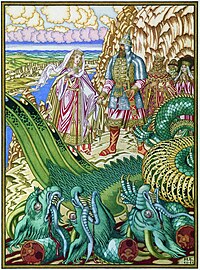
Back Портал:Фентъзи Bulgarian Wikiproyecto:Literatura fantástica Spanish Portale:Fantasy Italian Portaal:Fantasy Dutch Portal:Fantasy Polish Портал:Фэнтези Russian Портал:Фентезі Ukrainian

Selected fantasy workJonathan Strange & Mr Norrell is the first novel by British writer Susanna Clarke. An alternative history set in 19th-century England around the time of the Napoleonic Wars, it is based on the premise that magic once existed in England and has returned with two men: Gilbert Norrell and Jonathan Strange. Centring on the relationship between these two men, the novel investigates the nature of "Englishness" and the boundary between reason and madness. It has been described as a fantasy novel, an alternative history, and a historical novel. The narrative draws on various Romantic literary traditions, such as the comedy of manners, the Gothic tale, and the Byronic hero. The novel's language is a pastiche of 19th-century writing styles, such as those of Jane Austen and Charles Dickens. Clarke describes the supernatural with mundane details. She supplements the text with almost 200 footnotes, outlining the backstory and an entire fictional corpus of magical scholarship. Clarke began writing Jonathan Strange & Mr Norrell in 1993; ten years later she submitted the manuscript for publication. It was accepted by Bloomsbury and published in September 2004, with illustrations by Portia Rosenberg. Bloomsbury was so sure of its success that they printed 250,000 hardcover copies. The novel was well-received by critics and reached number three on the New York Times bestseller list. It was longlisted for the 2004 Man Booker Prize and won the 2005 Hugo Award for Best Novel. Fantasy topics
Related Portals |
© MMXXIII Rich X Search. We shall prevail. All rights reserved. Rich X Search
